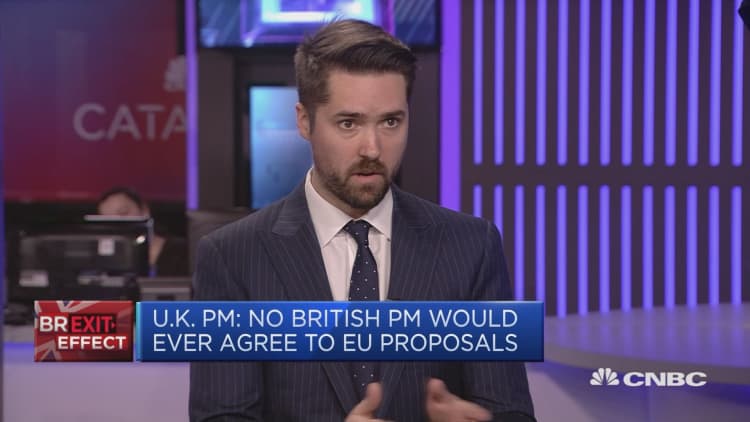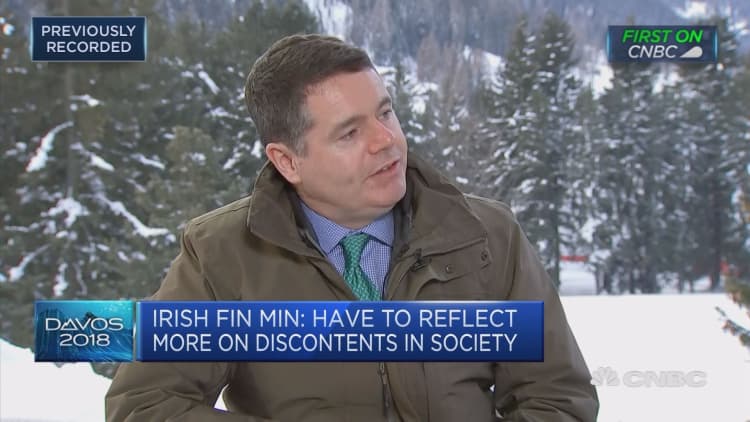British Prime Minister Theresa May set out her vision on Friday for a Brexit deal deeper and wider than any free trade agreement in the world, telling the European Union it is in their "shared
interest".
Below are the highlights from her speech and a follow-up question-and-answer session with reporters:
May on implementation period
"We are close to agreement on the terms of the implementation period which was a key element in the December deal."
"Both the UK and EU are clear this implementation period must be time limited and cannot become a permanent solution."
May on complexity of task ahead

"We are now approaching a crucial moment. There is no escaping the complexity of the task ahead of us. We must not only negotiate our exit from an organisation that touches so many important parts of our national life, we must also build a new and lasting relationship while, given the uncertainty inherent in this negotiation, preparing for every scenario."
May on need for arbitration mechanism
"We will need an arbitration mechanism that is completely independent, something which again is common to free trade agreements. This will ensure that any disagreements about the purpose or scope of the agreement can be resolved fairly and promptly."
May on UK membership of EU agencies
"We will also want to explore with the EU how the UK could remain part of the EU agencies, such as the chemicals, medicines and aerospace industries.
"We would of course accept that this would mean abiding by the rules of those organisations and making an appropriate financial contribution."
May on challenges of negotiation ahead

"Yes there will be ups and downs in the months ahead. As in any negotiation no-one will get everything they want, we will not be buffeted by the demands to talk tough or threaten a walkout, just as we will not accept the counsels of despair that this simply cannot be done.
"We will move forward by calm patient discussion of each other's positions."
"We have a shared interest in getting this right so let's get on with it."
May when asked whether the UK will think again on Brexit
"No we won't think again on Brexit. The British people voted for Brexit and I think it is incumbent on their politicians to deliver on the decision that we asked them to take. Parliament overwhelmingly voted for this to be a decision of the British people and I think it's right that parliament and politicians now deliver on that."
May on Northern Ireland
"Successive British governments have worked tirelessly together with all the parties in Northern Ireland and with the Irish government to bring about the historic achievement of peace. This is an agreement that we have all worked hard to protect. That is why I have consistently put holding up the Belfast agreement at the heart of our approach.

"Our departure poses particular challenges for Northern Ireland and for Ireland. We joined the EU together 45 years ago and it's not surprising that our decision to leave has caused anxiety and a desire for concrete solutions.
"We have been clear all along that we don't want to go back to a hard border in Northern Ireland. We have ruled out any physical infrastructure at the border and related checks and controls, but it's not good enough to say "we won't enforce it if the EU forces Ireland to do it, that's down to them".
We chose to leave and we have a responsibility to help find a solution. But we can't do it on our own, it is for all of us to work together. And the Taoiseach and I agreed our teams should now do just that.
"Just as it would be unacceptable to go back to a hard border between Ireland and Northern Ireland, it would also be unacceptable to break up the United Kingdom's own common market by making a customs and regulatory border down the Irish sea."
May on parliamentary sovereignty
"People voted to take back control of our money, our laws and our borders and that's exactly what we will be doing. Yes there are some areas where, and ultimately parliament will always be sovereign, and it will be parliament that will make these decisions. There are some areas, as I've set out in the goods, er descriptions of goods, where from an economic point of view, businesses say it makes sense for us to operate on very much the same basis so that we can continue that good trading relationship, but the decision on those rules of course will be for parliament."


